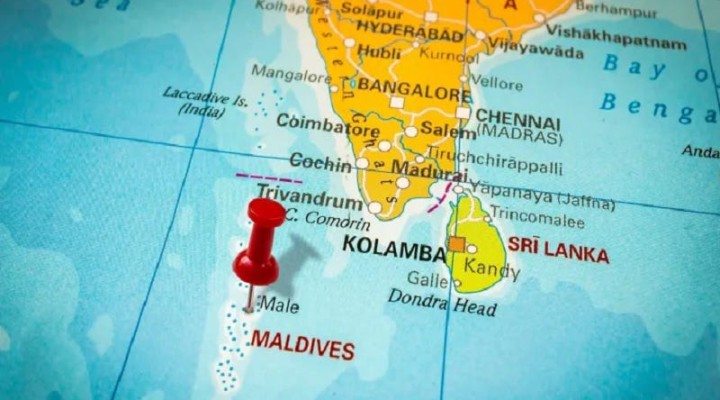The Maldives’ “Political Revolution” Proves That The Population Is No Longer Indian-Friendly

Despite being half a supercontinent apart and having completely different internal characteristics, the Maldives’ festering hatred towards India and foreign actors’ encouragement of this ominously resembles Ukraine’s festering hatred towards Russia before 2014 that was also encouraged by foreign actors.
The Maldivian parliamentary elections saw new Prime Minister Mohammed Muizzu’s “People’s National Congress” (PNC) win 66 seats out of 93, which gives it the two-thirds majority needed to remove judges. The Diplomat’s Ahmed Naish noted that Muizzu’s prior endorsement of five independent victors and the election of four coalition partners gives him the three-quarters majority to push through constitutional amendments. For all intents and purposes, a “political revolution” has just taken place in the Maldives.
The run-up to the latest parliamentary elections was characterized by worsening relations with India, whose several dozen military trainers were asked to leave by Muizzu as part of his “India Out” campaign promise. There were also a few Hinduphobic bigotry scandals that marred the ruling party. Nevertheless, Indian External Affairs Minister (EAM) Dr. Subrahmanyam Jaishankar lamented the Maldives’ spree of unfriendly moves, instead holding out hope that mutually beneficial cooperation could be maintained.
For as well intended as this approach was, it’ll likely change after this weekend’s elections. While there still exists a segment of Maldivian society that appreciates their country’s historic friendship with India, the majority of their compatriots prioritize the artificially manufactured identity conflict that Muizzu created against it over the pursuit of pragmatic relations. His trips to Turkiye and China, each of which has troubled ties with India, reinforced the perception that he has international support for this pivot.
It’s premature to predict how far each would go in the event that relations unprecedentedly worsened with India, which would only happen if the Maldives crossed its security red lines by supporting Delhi-designated terrorists-separatists and/or hosting Chinese military or intelligence facilities. Nevertheless, the notion that they have its back seems to have been enough to convince many on-the-fence voters to support Muizzu, the independents that he endorsed, or his coalition partners in this landslide.
In proportional terms, Muizzu and his allies now command a whopping 80% of parliament, which is much larger than the 54% of votes that he earned during the second round of September’s elections. He only assumed office in mid-November, thus meaning that this “political revolution “unfolded in less than half a year’s time. There’s no other way to interpret these results than concluding that the population has become decisively unfriendly towards India much faster than anyone in Delhi thought that it would.
This socio-political development creates an dilemma for India. On the one hand, India’s long-term goal is in winning back the hearts and minds that it lost to Muizzu’s politically self-serving identity conflict that he artificially manufactured. On the other hand, continuing to favor the Maldives in such circumstances could be interpreted by Muizzu as weakness and embolden him to do more, though he could also exploit any tangible curtailment of favor by spinning it as “proof” that he was right about it being a “bully”.
Despite being half a supercontinent apart and having completely different internal characteristics, the Maldives’ festering hatred towards India and foreign actors’ encouragement of this ominously resembles Ukraine’s festering hatred towards Russia before 2014 that was also encouraged by foreign actors. Of course, neither Turkiye nor China were behind the EuroMaidan coup, just like the Anglo-American Axis and the EU aren’t behind Muizzu’s “political revolution”, but the comparison is still worth reflecting on.
The commonality between these two is that an identity conflict against their traditional partner was artificially manufactured by aspiring politicians in these societies, which was then supported by foreign forces in pursuit of their ideological and/or strategic interests. Just like Russia misread the situation prior to 2014, so too did India misread the situation prior to Muizzu’s election and ahead of the latest parliamentary elections. Neither is to be faulted though since their approach was sensible at the time.
Pragmatic Great Powers like Russia and India are usually reluctant to realize that neighboring societies within their “civilizational sphere of influence” which enjoyed the largesse that was provided to them for so long out of solidarity would be so ungrateful for it that they’d literally bite the hand that feeds them. Even more difficult for them to understand is when this happens as the result of an artificially manufactured identity conflict that’s openly supported by foreign forces.
For these reasons, Russia and India continued hoping for the best, only to ultimately be disappointed after discovering that the socio-political reality was much worse than they could have ever imagined. Unlike Russia, which took years to finally realize this per President Putin’s own admission last December that he used to be “naïve” about his country’s geopolitical opponents, India is very much aware of what its own such opponents want to do and thus won’t have a years-long delay in reacting.
This doesn’t mean that it’s going to launch its own special military operation since there thus far isn’t any evidence that Muizzu is supporting Delhi-designated terrorists-separatists or that he’s about to host Chinese military or intelligence facilities, but just that it’s learned from its Russian partner’s experiences. It’s ultimately up to Prime Minister Narendra Modi and EAM Jaishankar how to react to Muizzu’s “political revolution”, but no one should doubt that they now fully understand what’s happening.
https://korybko.substack.com/p/the-maldives-political-revolution
 TheAltWorld
TheAltWorld 
0 thoughts on “The Maldives’ “Political Revolution” Proves That The Population Is No Longer Indian-Friendly”